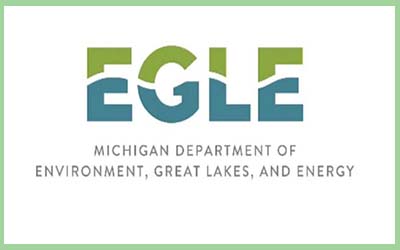
Aquatic Invasive Species Awareness Week June 27-July 4
|
|

|
|

MIOSHA updates COVID-19 emergency rules to align with Federal OSHA
June 22, 2021
Media Contact: Camara Lewis, 517-930-4928
Today, the Michigan Occupational Safety and Health Administration (MIOSHA) filed COVID-19 emergency rules to align with Federal OSHA’s Emergency Temporary Standard (ETS). The updated rules are effective today and set to expire Dec. 22, 2021. The rules rescind the emergency rules issued on May 24, 2021 and focus on health care.
The updated MIOSHA emergency rules adopt the Federal OSHA ETS and focus on health care settings where known or suspected COVID-19 patients may be present. These workplaces may have a higher exposure risk for employees and need continued protections to mitigate the spread of COVID-19.
“As we continue to get Michigan back to work, our priority remains keeping workplaces safe for employees and protecting customers as they support these businesses,” said Governor Whitmer. “With our state at full capacity, we can boost our economic Jumpstart and ensure businesses can emerge from the pandemic stronger than ever while keeping their workers safe.”
Dialing back workplace rules for non-health care settings allows employers to use their best judgment in determining whether to maintain:
Nevertheless, MIOSHA strongly encourages workplaces to follow the available CDC and OSHA recommendations to mitigate hazards.
MIOSHA has a duty to protect Michigan workers and the agency’s emergency rules have provided employers and employees with the guidance and certainty they needed to stay safe. These updated rules demonstrate that the agency has the flexibility it needs to ensure consistency with federal OSHA.
Non-healthcare settings should align policies with CDC guidelines to ensure they help contain the spread of COVID-19. Federal OSHA has updated guidance for non-healthcare employers as well.
“These updates recognize the great progress we have made in Michigan to contain COVID-19 and the power of vaccinations. We will continue to provide critical workplace protections more focused on areas of increased COVID-19 risk,” said Michigan COVID-19 Workplace Safety Director Sean Egan. “In non-health care settings, it’s important that all employers recognize that they have a general duty to provide a safe workplace.”
To request MIOSHA’S consultation, education and training services, call 517-284-7720 or online at MIOSHA Request for Consultative Assistance.
For more information about MIOSHA’s safety and health guidelines to protect Michigan’s workforce, visit Michigan.gov/COVIDWorkplaceSafety. Employers and employees with questions regarding workplace safety and health may contact MIOSHA using COVID-19 hotline at 855-SAFE-C19 (855-723-3219).
To report health and safety concerns in the workplace, go to Michigan.gov/MIOSHAcomplaint.

|

FOR IMMEDIATE RELEASE June 22, 2021 Contact: Press@Michigan.gov
PHOTOS: Governor Gretchen Whitmer and Lt. Governor Gilchrist Celebrate Reopening of State to Full Capacity, Highlight the Administration’s Economic Jumpstart Plan More than nine million vaccines administered as new COVID cases fall to one-year low.
LANSING, Mich. – Governor Whitmer and Lt. Governor Gilchrist today celebrated the
“Today is a day that we have all been waiting for, as we can safely get back to normal day-to-day activities and move forward together,” said Governor Whitmer. “We owe a tremendous debt of gratitude to the medical experts and health professionals who stood on the frontlines to keep us all safe. And we are incredibly thankful to all of the essential workers who kept our state moving. Thanks to the millions of Michiganders who rolled up their sleeves to get the safe, effective COVID-19 vaccine, we have been able to make these changes ahead of schedule. Our top priority going forward is taking full advantage of the billions in federal relief funding and our $3.5 billion surplus to jumpstart our economy. We have a once-in-a-lifetime opportunity to ensure that Michigan’s families, small businesses, and communities emerge from this pandemic stronger than ever before.”
“This move positions our state to unlock the full economic potential of every person and community in Michigan. This is possible thanks to our dedicated health professionals and scientists who guided us through this pandemic and our targeted, effective vaccine rollout that helped Michiganders across the state access the vaccine,” said Lt. Governor Gilchrist. “This will be an adjustment for many working families. That is why our administration is proposing unprecedented investments in critical areas like higher wages, access to childcare, and equity in education to rebuild and recover. We must work together to use this exceptional opportunity presented to us by COVID-19 federal funding to build back better from the pandemic and create brighter futures for every Michigander.”
“As a small business owner Covid 19 was devastating to my business, but with the help of the State of Michigan and Governor Whitmer, we were able to maintain and stay open,” said Tiffany Barber, owner of Tiffany’s Delicious Dogs LLC. “Tiffany’s Delicious Dogs was a City of Detroit vendor for 15 years, forced to change our business model to survive. With grants and training funded by the State of Michigan, to learn new business techniques we made it together and are thankful to our great Governor and the State of Michigan for the support to make it through the storm. We look forward to getting back to business in a safe environment guided by a great leader.”
Case rates, percent positivity and hospitalizations have all plummeted over the past several weeks, while vaccination rates continue to increase. To date, 61.2% of Michiganders ages 16 and older receiving their first vaccine dose. As part of these efforts, Michigan is partnering with organizations across the state to create more opportunities for Michigan residents to receive a vaccine.
|